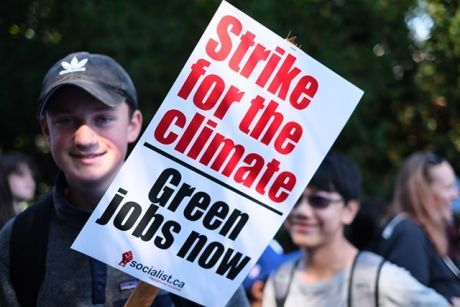Columns
You are here
Act Global - Act Local

December 12, 2019
There is an old slogan in the environmental movement: "Think global, act local" which urged action for the environment in people's own lives or in their communities while thinking of the global impact. Hugely influential, this idea has been behind many environmental actions over the years, and where it involves collective action in the local area for the environment it has been effective.
But with the power of marketing, and the influence of mass media, this slogan has also been used to urge individual consumer choices to solve global environmental problems. However, particularly among young people, these individual choices are seen to be inadequate in the face of a global climate crisis where 71% of emissions are caused by the 100 top corporations in the world. Yet it has been adapted for education, mathematics and even for business investment strategies.
An environmentalism that urges people to make the right individual choices as captive consumers in a global market does not address the structural issues that block meaningful change. Even where local environmental action is based on collective struggle, if it doesn't connect with other struggles against the system, it will fail to meet the environmental challenges that we face today: the intertwined climate and ecological crises that threaten to kill the planet.
The new environmental movement
Thankfully, a new wave of activism has swept the globe over the past year with an understanding of the limitations of individual consumer choices to effect meaningful change. Rather these new movements see collective action to disrupt the system as the way forward. From student led climate strikes that have mobilized millions worldwide, to Extinction Rebellions’s (XR) disruption of business as usual through the taking over of roads, bridges and city centres, to the weekly Fire Drill protests in Washington DC, featuring Jane Fonda and other celebrities these new tactics have inspired a revitalization of climate activism to a whole new level.
The massive global climate strike on September 27th was a seismic event, mobilizing many more people than local organizing networks could interact with. In subsequent weeks, people for whom these climate strikes are their first actions have stepped forward as activists in their local communities, making sure local governments are acting for climate justice. They have also stepped forward as a new wave of organizers for the disruptive actions of Fridays for Future and XR.
In addition, conversations that had begun prior to September among labour activists about mobilizing unions for climate justice have evolved into growing climate action networks in the labour movement. These networks have begun arguing for union locals to bargain for joint union-management climate committees in collective agreements as well as pushing their leadership to mobilize union members for the global climate justice actions.
There is a dialectical relationship between the global climate strikes and the efforts in unions and communities to affect climate action locally. Big climate strikes can give confidence to those fighting for local changes, such as indigenous pipeline blockades. Local climate action fights can feed energy back into the global movement. Connections made between the climate movement and other struggles against the system can strengthen the movements overall. And the stakes are higher than they've ever been.
Global Revolt
This global movement for climate justice is happening at the same time as huge struggles against the world economic system unfold across the globe. In Hong-Kong, pro democracy protests have exploded on the streets, adapting tactics to counter local government repression, with the might of China waiting in the wings. In Chile, after 30 years of neoliberalism, and almost 50 years after the Pinochet coup, a transit fare increase and subsequent fare strike sparked a wider revolt against the system, with long-planned international climate and economic meetings canceled with the unrest continuing. Sudan and Algeria have seen movements that have toppled their governments in a renewal of the Arab Spring, while the struggle against the system in Lebanon, initially to a WhatsApp tax, has united ordinary people against the neoliberal order across the sectarian divides that have helped Lebanese rulers maintain order for decades.
Each of these struggles is against the same system that is accelerating the climate crisis: capitalism. It is a system that carves the world into rival economic spheres that increasingly butt up against each other as they compete economically and militarily.
Whether capitalism is in crisis or is booming, the system increases the divide between the 1% and the majority, causing human suffering and destruction of the environment while distributing profits to those with their hand on the reins. Those in control cannot renounce profits to build a sustainable economy as this means stepping aside for another capitalist to take their place.
To defeat the system that is killing the planet we have to build the links between the disparate struggles against the system and organize to make all our movements stronger.
Ultimately, workers have the ability to shut down production, and call into question the rule of the capitalist drive for profit. We need a revolution to upend the system that benefits a tiny minority at the expense of the vast majority of humanity, and the life supporting capacity of the planet. The date and time for a revolution cannot be known in advance: by engaging in the struggles of today and building solidarity between the separate struggles against the system, we can prepare the ground for the revolutionary change that we so desperately need.
Section:










